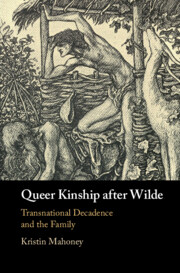Refine search
Actions for selected content:
4 results
Chapter 13 - Devotional Poetry
- from Part II - Forms and Genres
-
-
- Book:
- Michael Field in Context
- Published online:
- 03 October 2025
- Print publication:
- 25 September 2025, pp 114-122
-
- Chapter
- Export citation
Introduction
-
- Book:
- Queer Kinship after Wilde
- Published online:
- 15 September 2022
- Print publication:
- 06 October 2022, pp 1-30
-
- Chapter
- Export citation
Chapter 3 - An Extraordinary Marriage
- from Part II - Queer Retreat and Cosmopolitan Community
-
- Book:
- Queer Kinship after Wilde
- Published online:
- 15 September 2022
- Print publication:
- 06 October 2022, pp 95-125
-
- Chapter
- Export citation

Queer Kinship after Wilde
- Transnational Decadence and the Family
-
- Published online:
- 15 September 2022
- Print publication:
- 06 October 2022
